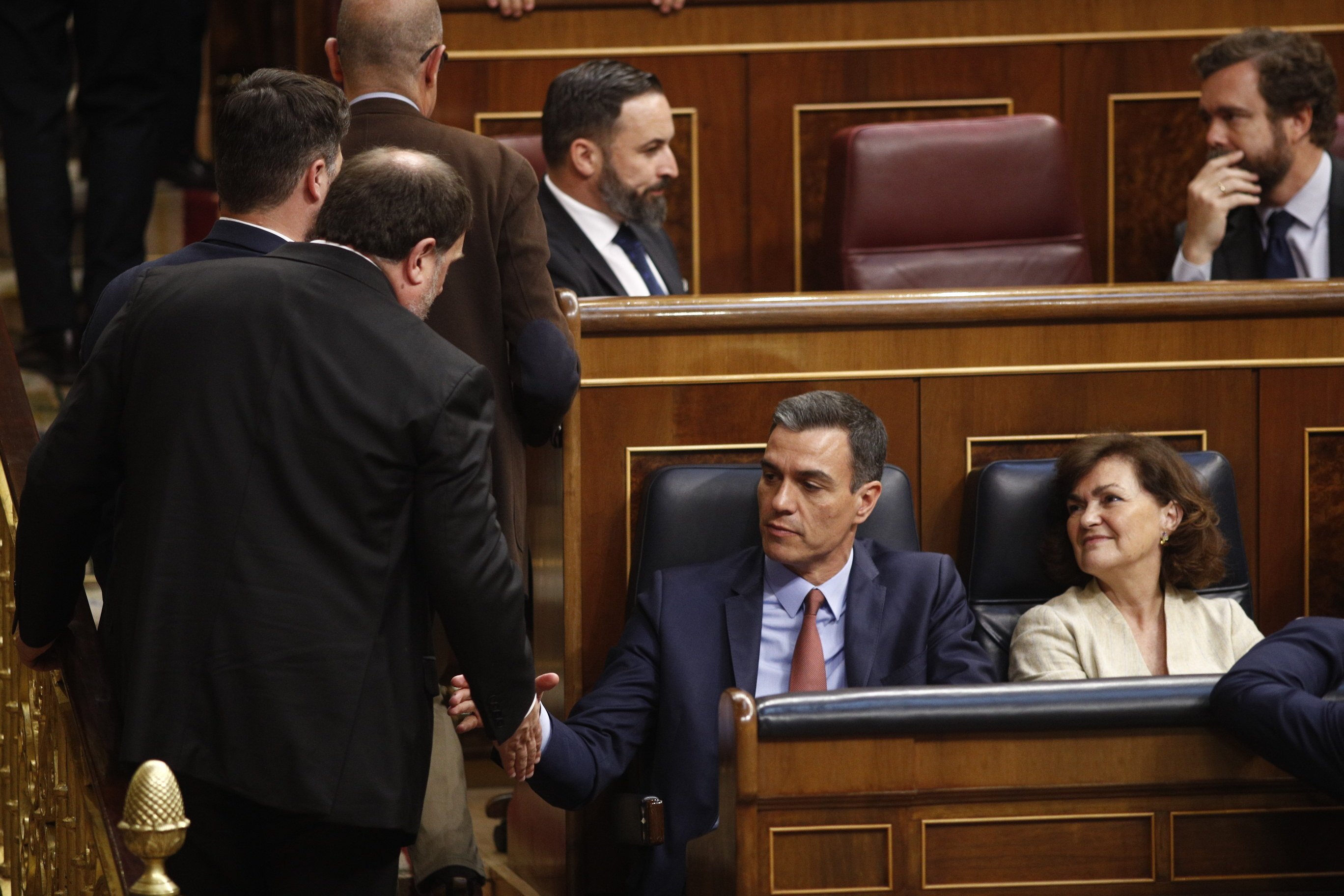The clock is ticking, and with one month left until the deadline for Pedro Sánchez to be invested as head of a new Spanish government, the Catalan Republican Left (ERC) considers that an accord is somewhere between far away and very far away. Right now, the balance of the negotiation with the Socialists (PSOE) veers between the Republicans' total rejection of the statement proposed by the PSOE of the reasons that justify the amnesty law and the zero progress on issues of day-to-day governance, such as the transfer of the Rodalies rail service to Catalonia, ERC sources have told El Nacional.cat.
In the last few hours, the Catalan pro-independence party has communicated multiple messages that the negotiation with the PSOE is not progressing, conveying its displeasure to the Socialists. The person tasked with sharing the bad report was the president of the ERC parliamentary group, Josep Maria Jové, who met this Thursday in Barcelona with the acting Spanish presidency minister, Félix Bolaños, as the ACN agency reported. Jové then conveyed the content of the meeting to the Catalan president, Pere Aragonès. Prior to that, ERC party president Oriol Junqueras, speaking after a meeting in Belfast with the former Sinn Féin leader, Gerry Adams, had been blunt. For Junqueras, "it is impossible for there to be an agreement if the Spanish government does nothing to reach it". In addition, the spokesperson for the Catalan government, Patrícia Plaja, in an interview with radio station SER, stated: "Progress is not being made as it should be if they want to meet the deadlines".
The three issues of the negotiation
Of the "three files" into which the ERC has divided the issues to be negotiated with the PSOE - the amnesty for all those accused in the process, the political conflict between Catalonia and Spain and issues such as financing and the transfer of Rodalies - all are beset with difficulties. With regard to the amnesty, key to an agreement with both ERC and Junts, who between them hold the real key to the investiture, there is currently a resounding refusal among the Republicans to accept what the Socialists have presented. ERC is unable to accept the PSOE's statement of reasons for the amnesty law, in which the Socialists intend to include the "criminal" nature of the October 1st referendum so that they do not call into question the Supreme Court ruling sentencing the pro-independence leaders to prison. This is a "red line" that ERC will not cross, say the sources.
There have also been no significant advances in the second file, that of the management of the political conflict between Catalonia and the Spanish state, recognized at the dialogue table between the Spanish and Catalan governments. Now, in the new political context after the general election on 23rd July, it would be a matter of "grounding" the issue with a new body, possibly based on the reformulation of the committee for monitoring agreements reached at the dialogue table, that was never even launched. It is worth mentioning, with repect to this point, that Junts calls for the creation of an international verification mechanism. During the period of the dialogue table started under the government of Quim Torra and continued with that of Pere Aragonès without Junts joining it, the PSOE rejected the introduction of an independent "rapporteur" figure who would record the agreements reached.
In addition, the Socialists are not making things easy for ERC in the third area of the negotiations, focused on matters such as autonomous community financing and the transfer of the Rodalies rail services to Catalan hands. On the first issue, "not a single leaf has moved" beyond the floating of ideas and the sending of insinuations about debt forgiveness for the Catalan government which, should it materialize (something that has not happened, they note) would be seen positively by the Republicans. The real focus of ERC's unease is the attitude of the acting finance minister, María Jesús Montero, whose position they see as very closed.
A meagre offer for Rodalies
As for the transfer of the problematic Rodalies rail services to the Catalan government, an issue on which ERC campaigned at the July general election, the prospects could not be more discouraging: the PSOE has only proposed to hand over the ownership of two track sections which are exclusively used by Rodalies trains. The first is that of Rodalies de Lleida, which the Catalan public rail operator FGC already manages. And the second, the stretch of track between Papiol and Bellaterra, the last part of the rail network built by the state in Catalonia, in 1977, initially intended for the transport of goods and later converted for the transport of passengers.
Despite the optimism that Sánchez himself tries to convey, and the fact that ERC have been part of the PSOE parliamentary majority for the past five years, Junqueras and company do not want to hand a blank cheque to the Socialists or give Carles Puigdemont's party all the prominence in a negotiation in which they play a decisive role. At ERC headquarters, they say that if the PSOE wants to have Sánchez's investiture ready to go on November 6th with its vote - as has been speculated in Socialist circles - "they will have to hurry".

